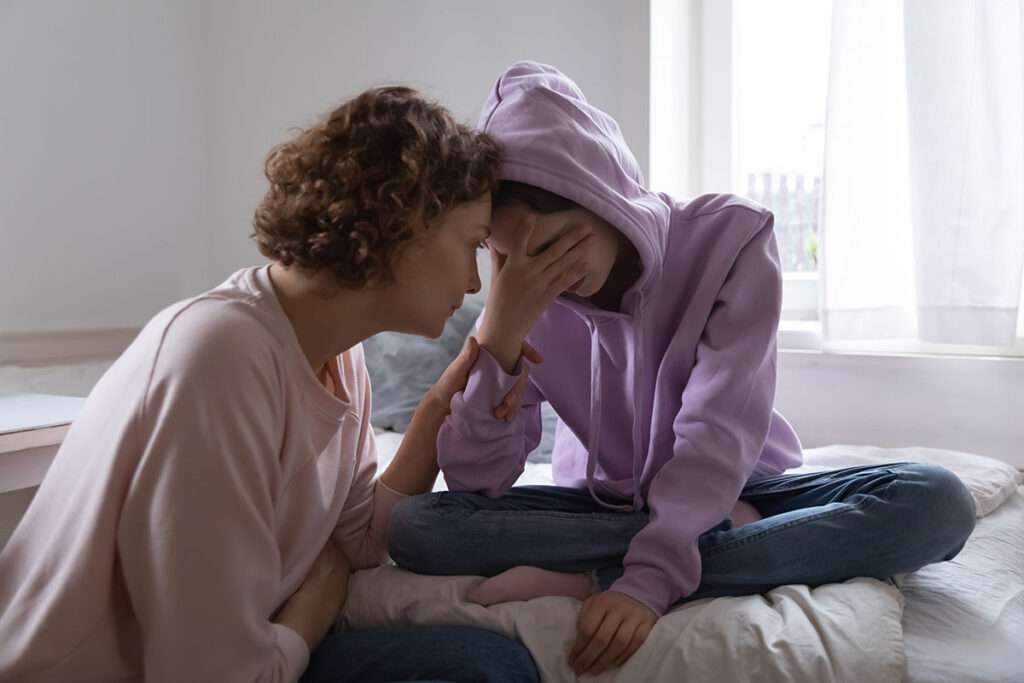Childhood depression is a serious and often overlooked condition, affecting millions of children worldwide. For parents, the question of “how to tell if my child is depressed” can feel overwhelming, especially when the signs are subtle or mistaken for typical childhood moods. Early recognition and support are critical in helping your child overcome this challenging time. By understanding the warning signs, initiating thoughtful conversations, and seeking the right depression treatment in California, you can be a pillar of support in your child’s mental health journey.
What Are 5 Warning Signs of Depression?
Children experience and express depression differently than adults. While sadness or irritability might be the most apparent signs, others are less noticeable yet equally impactful. Let’s consider five key indicators to watch for. By keeping these signs in mind, you’ll gain clarity when assessing your child’s emotional well-being:
1. Withdrawal from Activities
Has your child stopped enjoying things they once loved? Losing interest in hobbies, sports, or social interactions is a common sign of depression. For instance, a child who used to spend hours playing soccer may now prefer to stay isolated in their room.
2. Changes in Sleep Patterns
Depression can disrupt sleep in various ways. Your child might struggle with insomnia, frequently waking in the middle of the night, or sleeping much more than usual and still feeling exhausted during the day.
3. Appetite and Weight Changes
Noticeable shifts in eating habits, like suddenly having no appetite or turning to food for comfort, can signal underlying emotional struggles. These changes might also lead to weight loss or gain.
4. Persistent Sadness or Irritability
While it’s normal for children to feel sad occasionally, consistent or extreme sadness over weeks or months isn’t typical. Alternatively, if sadness shows up as irritability, frequent outbursts, or frustration, it could indicate depression.
5. Academic Struggles
Depression often interferes with concentration and motivation, potentially causing grades to drop or noticeable disinterest in school. If your child suddenly seems lost when it comes to homework or tests, it might be more than academic stress.
A Parent’s Checklist for Recognizing Depression
To better understand whether depression is affecting your child, it can help to evaluate their behavior systematically. Use this checklist as a guide:
- Does your child display frequent mood swings or express feelings of hopelessness?
- Have they stopped participating in activities they used to enjoy?
- Are there obvious changes in eating or sleeping habits?
- Have teachers or caregivers mentioned unusual behavior at school, such as trouble focusing or social withdrawal?
- Does your child complain of unexplained physical symptoms like stomachaches or headaches?
If you find yourself answering “yes” to multiple questions, it’s crucial to take the next steps.
What to Do If You Suspect Your Child Is Depressed
Discovering signs of depression in your child may feel paralyzing, but you are not alone, and actionable steps can make a difference. The first step? Start the conversation.
Approach With Compassion
Choose a calm, private moment to express your concerns. Avoid making assumptions or judgments. Instead, try, “I’ve noticed you don’t seem as happy lately. Can you tell me more about how you’re feeling?” This allows your child to express themselves without fear of criticism.
Listen Without Interruptions
Even if their feelings catch you off guard or feel unfamiliar, remember that this is their lived experience. Validate their emotions with phrases like, “That sounds really hard,” or, “I’m here for you.”
Monitor Their Behavior
Note any patterns over time, as this information will be helpful if you decide to speak with a professional.
Know When to Seek Professional Help
If your child seems overwhelmed, consistently unhappy, or has thoughts of self-harm, reach out to a licensed therapist or counselor who specializes in childhood mental health.
Which Symptoms Are Commonly Seen in a Child With Depression?
Along with the signs already discussed, some children may exhibit additional symptoms, including excessive guilt, restlessness, or difficulty controlling their emotions. For some kids, depression can even manifest as physical complaints like unexplained aches and pains.
At HillsidesCares, we take a comprehensive approach to treating depression in children. From family and group therapy to unique modalities like mindfulness meditation, equine therapy, and cognitive-behavioral therapy (CBT), we offer personalized care that meets each young person where they are.
Treatment Options for Childhood Depression
If you’re searching online for the phrase, how to tell if my child is depressed, know that effective treatments are available. Therapies like CBT and dialectical behavior therapy (DBT) are evidence-based options that help children develop coping skills and manage negative thought patterns. Supportive environments, such as HillsidesCares’ residential and outpatient programs, can be vital in helping your child thrive.
Additionally, incorporating holistic practices, such as yoga, art, and music, alongside counseling can promote healing and self-expression. For children who experience overlapping challenges, such as ADHD or trauma, our tailored programs address the full scope of their needs.
Take the Next Step Today With HillsidesCares
Understanding how to tell if my child is depressed is just the beginning. Acting on your observations could open doors to hope and recovery for your child. HillsidesCares is here to support you every step of the way.
If you believe your child may be battling depression, call us today at 323.641.4842 or use our online contact form to learn more about how our compassionate, trauma-informed care can help lead the way to healing. Together, we’ll build a path toward a brighter tomorrow.

